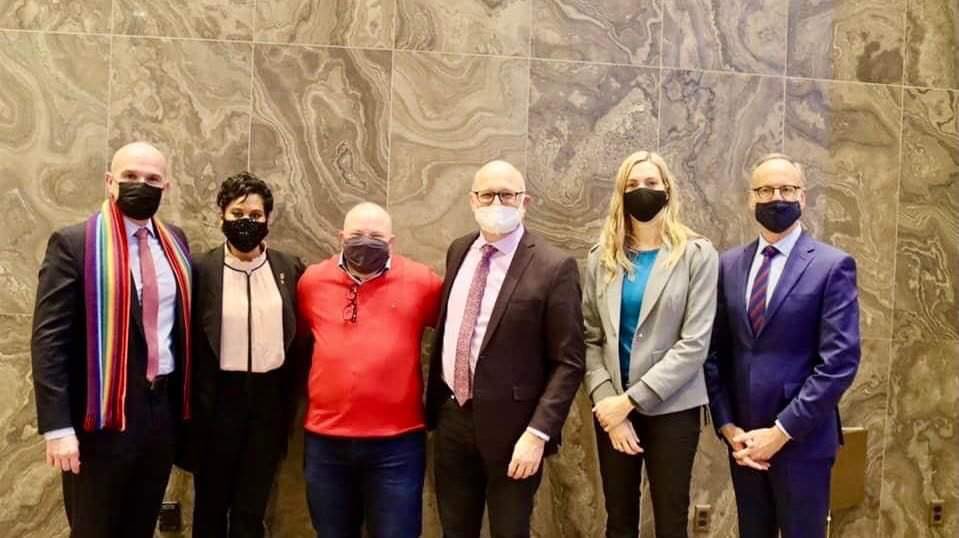Canada News
Government introduces legislation to ban conversion therapy practices in Canada

Diversity and inclusion are among Canada’s greatest strengths. Everyone should be able to live a true and authentic life, free from violence and discrimination, no matter who they are or who they love.
Today, the Honourable David Lametti, Minister of Justice and Attorney General of Canada, and the Honourable Marci Ien, Minister for Women and Gender Equality and Youth, introduced proposed amendments to the Criminal Code to ban so-called conversion therapy practices in Canada. This bill would make Canada’s criminal laws on conversion therapy practices among the most comprehensive in the world.
The legislation proposes four new Criminal Code offences that would prohibit:
- causing another person to undergo conversion therapy
- removing a minor from Canada to subject them to conversion therapy abroad
- profiting from providing conversion therapy
- advertising or promoting conversion therapy
The proposed legislation would also authorize courts to order the seizure of conversion therapy advertisements or to order their removal from computer systems or the Internet.
This bill expands on Bill C-6, adopted by the House of Commons in the previous Parliament. It does so by protecting all Canadians—regardless of their age—from the well-documented harms of conversion therapy practices.
Conversion therapy practices aim to change an individual’s sexual orientation to heterosexual, to change an individual’s gender identity to cisgender, or to change their gender expression to match the sex they were assigned at birth. They harm and further stigmatize sexual and gender-diverse persons and undermine their equality and dignity. They reflect myths and stereotypes about lesbian, gay, bisexual, transgender, queer and Two-Spirit (LGBTQ2) communities, particularly that their sexual orientation, gender identity or gender expression are wrong. These harmful practices also reinforce heteronormative and cis-normative ideas, as well as gender-conformity on LGBTQ2 individuals.
The practice can take various forms, including counselling and behavioural modification. Conversion therapy practices are discriminatory and have been proven to be harmful to the physical, mental and social well-being of the victim, even for adults who consented to it.
Criminal law reform is an important step in protecting the equality and dignity of LGBTQ2 persons, but more remains to be done. The Government of Canada is committed to working with provinces, territories, municipalities, survivors and stakeholders to ensure that Canada is a country where everyone—regardless of their gender expression, gender identity, or sexual orientation—can live equally and freely.
Quotes
“Conversion therapy has been discredited and denounced by professional and health associations in Canada and indeed around the world. It has no basis in science or in health care practices. Too many Canadians have undergone conversion therapy and have had to live with its harmful effects. That’s why our Government is stepping up to do our part to make sure that no one else has to face this devastating practice.”
The Honourable David Lametti, P.C., Q.C., M.P.
Minister of Justice and Attorney General of Canada
“The pain and trauma caused by conversion therapy practices continue to have a devastating impact on LGBTQ2 communities across Canada. Our government is focused on promoting equality rights and tackling discrimination against lesbian, gay, bisexual, transgender, queer, and Two-Spirit people. Criminalizing this practice upholds basic human rights, while also ensuring that every Canadian is free to live their authentic lives.”
The Honourable Marci Ien, P.C., M.P.
Minister for Women and Gender Equality and Youth
Quick facts
- According to the results of the 2019-2020 Community-Based Research Centre Sex Now Survey, 10% of sexual minority men who responded to the survey had been subjected to conversion therapy practices. The results of the Survey also showed that lower income, Indigenous, racialized and gender-diverse persons are disproportionately represented among those exposed to conversion therapy.
- Ontario, Nova Scotia, PEI, Yukon and Québec have enacted legislation addressing different aspects of conversion therapy in their jurisdiction. Other jurisdictions have implemented non-legislative measures, such as Manitoba, which issued a position statement indicating that it expects health professionals to ensure that conversion therapy is not practised in the province.
- Some Canadian municipalities, such as Vancouver, B.C., Calgary, Edmonton, St. Albert, Strathcona County, Lethbridge, Wood Buffalo and Spruce Grove, Alberta, Saskatoon and Regina, Saskatchewan and Kingston, Ontario are banning the practice and promotion of conversion therapy within their city limits.





















